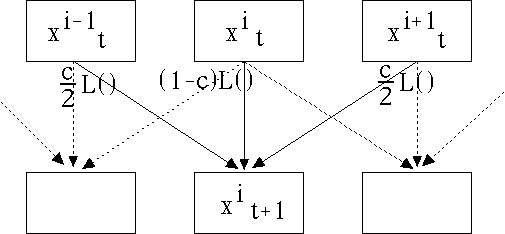
To make a simple example of a system that can synchronize even when chaotic, take N logistic maps and couple each to its nearest neighbors. Letting
stand for populations 1, ..., N in generation t, we obtain the populations in
generation
| x1t+1 | = | (1-c)L(x1t) + (c/2)(L(xNt) + L(x2t)) |
| x2t+1 | = | (1-c)L(x2t) + (c/2)(L(x1t) + L(x3t)) |
| x3t+1 | = | (1-c)L(x3t) + (c/2)(L(x2t) + L(x4t)) |
| ... | ||
| xN-1t+1 | = | (1-c)L(xN-1t) + (c/2)(L(xN-2t) + L(xNt)) |
| xNt+1 | = | (1-c)L(xNt) + (c/2)(L(xN-1t) + L(x1t)) |
This configuration is an example of a coupled map lattice. Graphically, we have
 |
Here c is the coupling constant, a measure how how strongly each value depends on its neighbors. For examaple,
Return to Synchronization of Chaotic Processes.